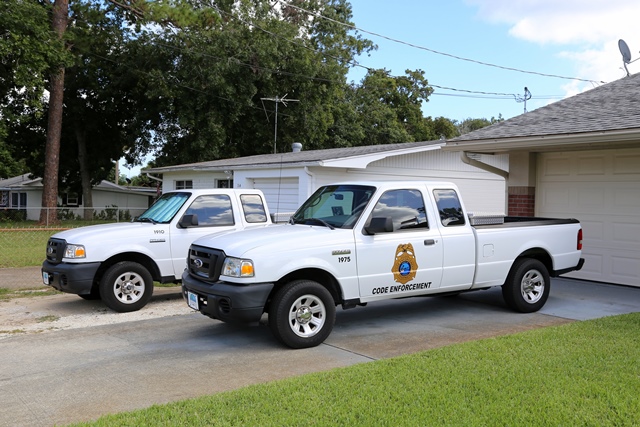Code Enforcement
Code enforcement is a service provided by the City of Edgewater to ensure compliance with City ordinances approved by the City Council. Local ordinances regulate property maintenance (for example – tall grass and weeds), zoning (for example – where a certain type of business may be located), fire safety (for example – how many occupants are allowed in a building) and building codes (for example – what materials may be used to construct a fence). Local ordinances are created to promote public health, safety and to safeguard property values. These local ordinances also incorporate some State and nationally recognized regulations and standards.
The Code Enforcement division is committed to providing an equitable, expeditious, effective and inexpensive method of enforcing the local ordinances approved by our City Council. The first priority of Code Enforcement is to help property owners achieve compliance. Anyone who receives a notice from Code Enforcement is encouraged to contact the department as soon as you are notified.
The City of Edgewater employs two full time Code Enforcement Officers. The officers spend the majority of their days in the field responding to complaints and doing routine checks of various neighborhoods.
Code enforcement is a legal process so it may take time (5-20 days) before you see results after contacting Code Enforcement about a violation.
The typical process of how a code enforcement issue is handled:
- Complaint received and investigated
- If possible, officer makes contact with involved party owner to affect immediate correction
- If officer is unable to make contact, a courtesy notice is left at the location or mailed to the owner
- If still in violation no correction is made, a notice of violation is issued
- If still in violation and no correction is made, a citation is issued
- A hearing will be scheduled in front of the Special Magistrate
Benefit of Code Enforcement
Communities with deteriorating properties may see an increase in crime rates and a decrease in property values. Vacant buildings, garbage, ill-cared for lawns, and deteriorating residences contribute to poor community conditions. Code enforcement officers are people that enforce codes, rules and regulations in order to maintain safe and healthy property conditions. These individuals help maintain and preserve the quality of communities.
Code enforcement officers play a crucial role in daily community operations and quality of life. Their duties have a direct impact on property values and community image. It is inevitable that a property will age with the progression of time. By enforcing property standards and working to keep up with aging, deteriorating properties, the code enforcement officers are able to combat community imperfections and loss of value. Some struggles that code enforcement officials face include:
- Vacant buildings
- Garbage and clutter
- Untidy lawns full of tall grass and weeds
- Graffiti and property destruction
Studies reveal that communities with poor conditions tend to attract more crime. In addition to the increase in crime rates, the community members are faced with a significant drop in property values, resulting in difficulty selling their home or in profiting from any possible sales.
In addition to deterring crime and decreasing property values, code enforcement officials also maintain the safety and well-being of the community members by insuring the maintenance of habitable property conditions. Situations such as hoarding circumstances, fire code violations, and unsanitary living conditions can put the health and lives of residents at risk. Enforcing ordinances such as fire codes, building codes, and general property standards is crucial and lifesaving.
With increasing financial and housing concerns, the position of code enforcement officers is even more vital. Foreclosed properties and bankruptcies are on the rise, making it difficult for communities to manage property conditions. In some situations the home owners may destroy the home out of anger, resulting in vacant properties full of clutter, trash, and even biohazards.
File a Complaint:
- Online: https://www.cityofedgewater.org/fire/page/code-enforcement-contact
- Email: codeenforcement@cityofedgewater.org
- Phone: 386-424-2400 ext. 2210
Please note that due to a change in Florida Law effective July 1, 2021, we are prohibited from responding to anonymous code enforcement complaints for service.

